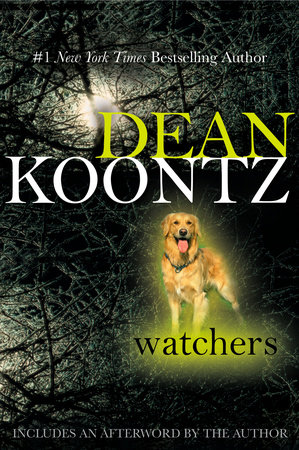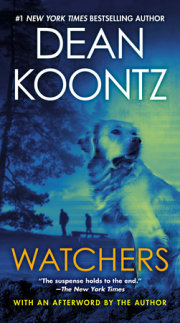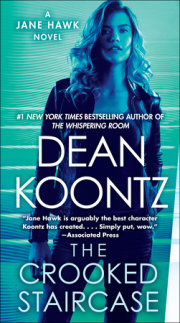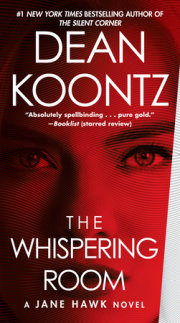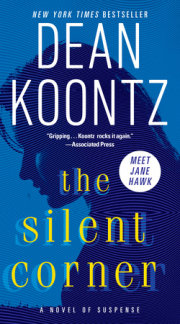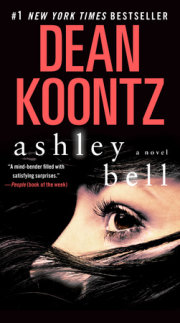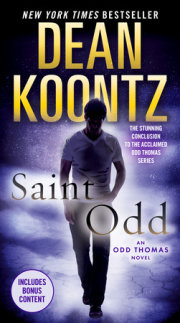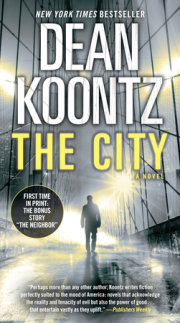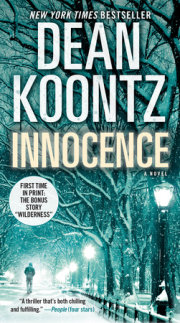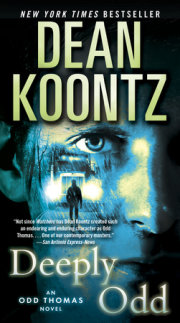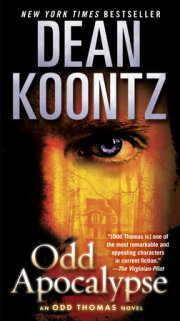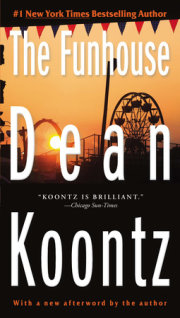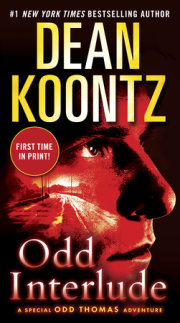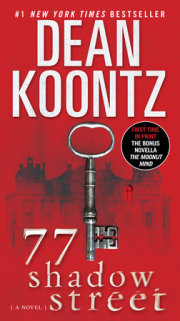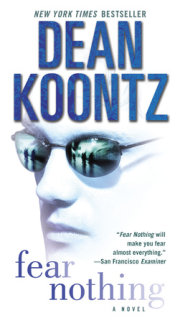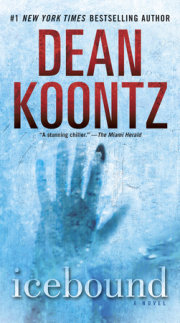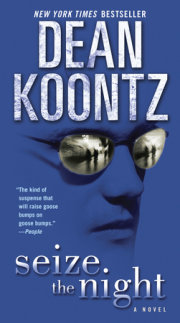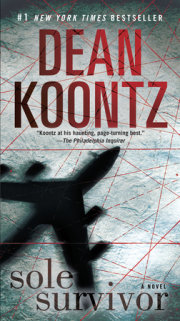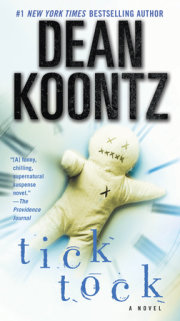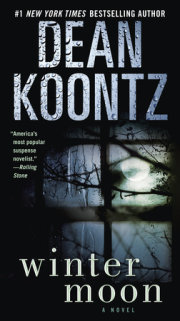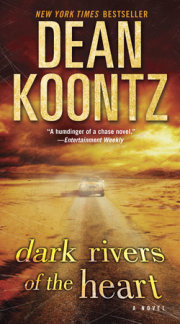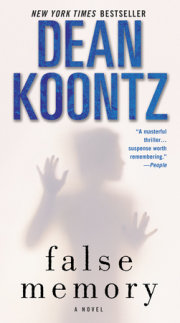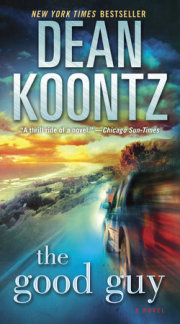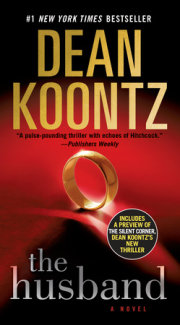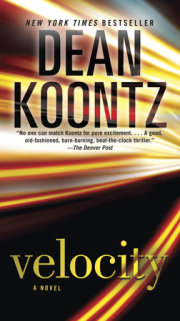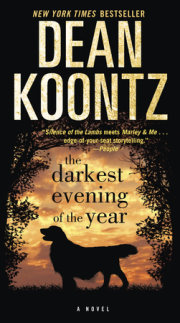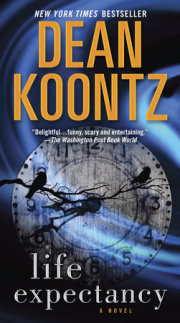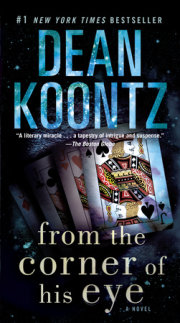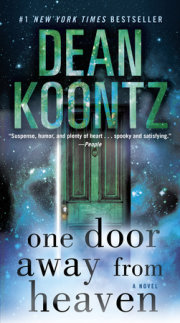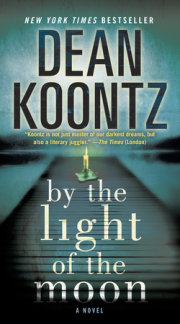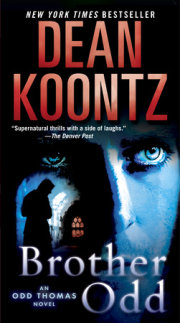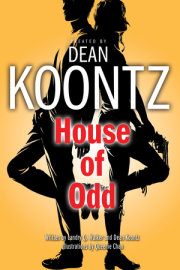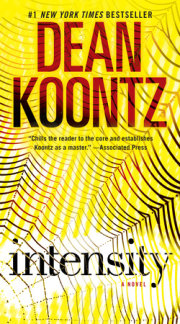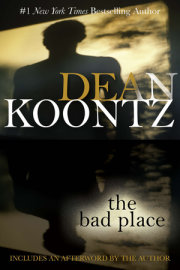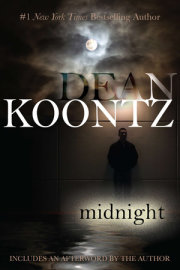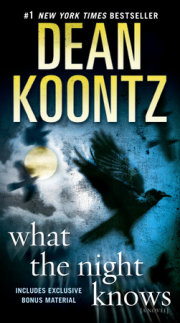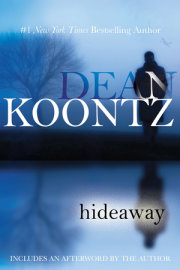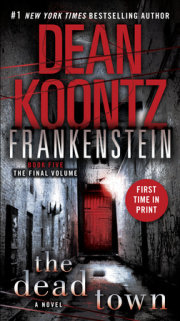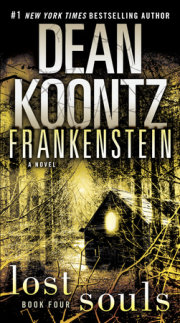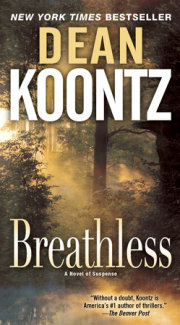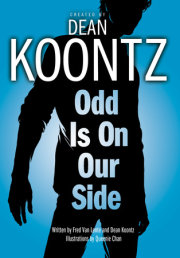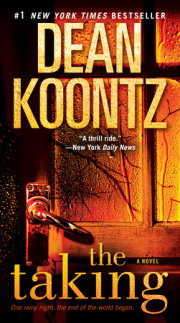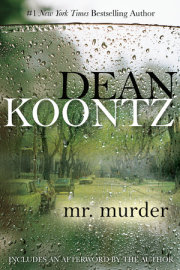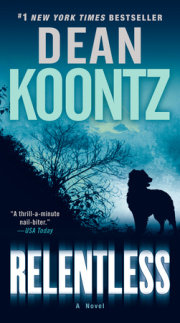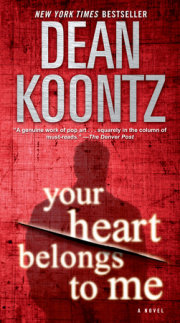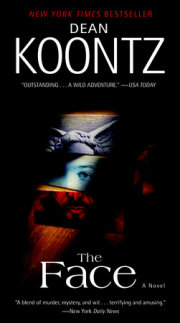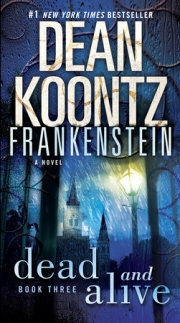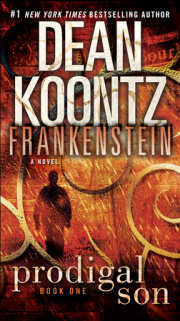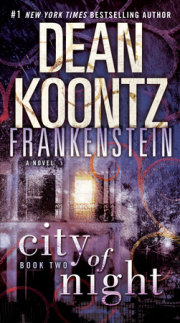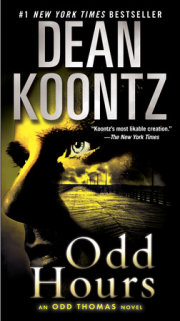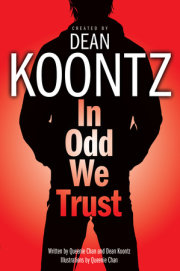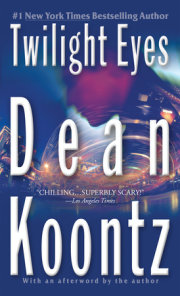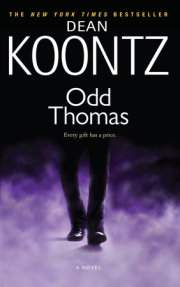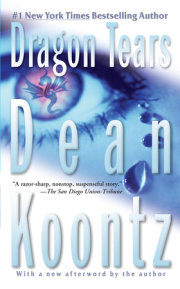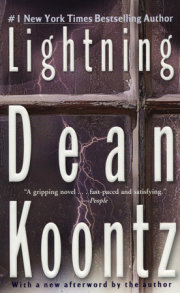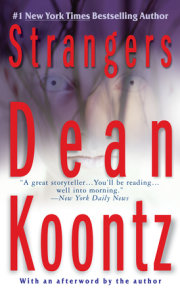Title Page
Copyright Page
Dedication
part one - SHATTERING THE PAST
chapter one
chapter two
chapter three
chapter four
chapter five
chapter six
chapter seven
part two - GUARDIAN
chapter eight
chapter nine
chapter ten
chapter eleven
AFTERWORD BY DEAN KOONTZ
“A winner. Give this one a straight 10 right across the board.”
—The San Francisco Examiner
“Watchers gives new meaning to the word terror . . . Koontz’s most original novel yet.” —Erie Times-News
“Watchers is an absorbing, intelligent, and altogether touching book.”
—West Coast Review of Books
“If you like suspense, grab Dean Koontz’s Watchers . . . It is utterly chilling.”
—Essex Journal
“Koontz weaves a tight plot, full of twists and complications, as he builds up the suspense to the inevitable violent confrontation.”
—The Oakland Press
“Keeps the reader on the edge of his seat. Keen-edged, insightful . . . thought-provoking.” —Asbury Park Press
“A spine-tingling thriller . . . Readers who are seeking a riveting page-turner should look no further, because Watchers offers an engrossing read with an unusually satisfying conclusion.” —Chattanooga Times Free Press
“An entertaining and exciting book that hooks you early and keeps you turning the pages . . . suspense builds and builds . . . totally enthralling.”
—The Orange County Register
“Mind-boggling suspense . . . This sensational book will have you gnashing your teeth at the villains and wiping away your tears as your affection grows for the other characters . . . Watchers never lags for an instant . . . Koontz has learned to cross the barrier between horror and literature and his books have become things of beauty.” —Ocala Star-Banner
“One of the most exciting terror tales of the season . . . marvelously effective . . . as well controlled as it is well written . . . Koontz has our vote as the best now working in his field.” —Anniston Star
“Relentless suspense and mounting tension . . . The climax is a stunner.”
—Cape Cod Times
Berkley titles by Dean Koontz
THE EYES OF DARKNESS
THE KEY TO MIDNIGHT
MR. MURDER
THE FUNHOUSE
DRAGON TEARS
SHADOWFIRES
HIDEAWAY
COLD FIRE
THE HOUSE OF THUNDER
THE VOICE OF THE NIGHT
THE BAD PLACE
THE SERVANTS OF TWILIGHT
MIDNIGHT
LIGHTNING
THE MASK
WATCHERS
TWILIGHT EYES
STRANGERS
DEMON SEED
PHANTOMS
WHISPERS
NIGHT CHILLS
DARKFALL
SHATTERED
THE VISION
THE FACE OF FEAR
THE BERKLEY PUBLISHING GROUP
Published by the Penguin Group
Penguin Group (USA) Inc.
375 Hudson Street, New York, New York 10014, USA
Penguin Group (Canada), 90 Eglinton Avenue East, Suite 700, Toronto, Ontario M4P 2Y3, Canada
(a division of Pearson Penguin Canada Inc.)
Penguin Books Ltd., 80 Strand, London WC2R 0RL, England
Penguin Group Ireland, 25 St. Stephen’s Green, Dublin 2, Ireland (a division of Penguin Books Ltd.)
Penguin Group (Australia), 250 Camberwell Road, Camberwell, Victoria 3124, Australia
(a division of Pearson Australia Group Pty. Ltd.)
Penguin Books India Pvt. Ltd., 11 Community Centre, Panchsheel Park, New Delhi—110 017, India
Penguin Group (NZ), 67 Apollo Drive, Rosedale, North Shore 0632, New Zealand
(a division of Pearson New Zealand Ltd.)
Penguin Books (South Africa) (Pty.) Ltd., 24 Sturdee Avenue, Rosebank, Johannesburg 2196,
South Africa
Penguin Books Ltd., Registered Offices: 80 Strand, London WC2R 0RL, England
WATCHERS
This is a work of fiction. Names, characters, places, and incidents either are the product of the author’s imagination or are used fictitiously, and any resemblance to actual persons, living or dead, business establishments, events, or locales is entirely coincidental.
Copyright © 1987 by Nkui, Inc.
“Afterword” copyright © 2003 by Dean Koontz.
All rights reserved.
No part of this book may be reproduced, scanned, or distributed in any printed or electronic form
without permission. Please do not participate in or encourage piracy of copyrighted materials in
violation of the author’s rights. Purchase only authorized editions.
BERKLEY® is a registered trademark of Penguin Group (USA) Inc.
The “B” design is a trademark belonging to Penguin Group (USA) Inc.
PRINTING HISTORY
eISBN : 978-1-4406-3929-6
This book is dedicated to Lennart Sane who is not only the best at what he does but who is also a nice guy. And to Elisabeth Sane who is as charming as her husband.
part one
SHATTERING THE PAST
The past is but the beginning of a beginning, and all that is and has been is but the twilight of the dawn.
—H. G. Wells
The meeting of two personalities is like the contact of two chemical substances: if there is any reaction, both are transformed.
—C. G. Jung
chapter one
1
On his thirty-sixth birthday, May 18, Travis Cornell rose at five o’clock in the morning. He dressed in sturdy hiking boots, jeans, and a long-sleeved, blue-plaid cotton shirt. He drove his pickup south from his home in Santa Barbara all the way to rural Santiago Canyon on the eastern edge of Orange County, south of Los Angeles. He took only a package of Oreo cookies, a large canteen full of orange-flavored Kool-Aid, and a fully loaded Smith & Wesson .38 Chief’s Special.
During the two-and-a-half-hour trip, he never switched on the radio. He never hummed, whistled, or sang to himself as men alone frequently do. For part of the drive, the Pacific lay on his right. The morning sea was broodingly dark toward the horizon, as hard and cold as slate, but nearer shore it was brightly spangled with early light the colors of pennies and rose petals. Travis did not once glance appreciatively at the sun-sequined water.
He was a lean, sinewy man with deep-set eyes the same dark brown as his hair. His face was narrow, with a patrician nose, high cheekbones, and a slightly pointed chin. It was an ascetic face that would have suited a monk in some holy order that still believed in self-flagellation, in the purification of the soul through suffering. God knows, he’d had his share of suffering. But it could be a pleasant face, too, warm and open. His smile had once charmed women, though not recently. He had not smiled in a long time.
The Oreos, the canteen, and the revolver were in a small green nylon backpack with black nylon straps, which lay on the seat beside him. Occasionally, he glanced at the pack, and it seemed as if he could see straight through the fabric to the loaded Chief’s Special.
From Santiago Canyon Road in Orange County, he turned onto a much narrower route, then onto a tire-eating dirt lane. At a few minutes past eight-thirty, he parked the red pickup in a lay-by, under the immense bristly boughs of a big-cone spruce.
He slipped the harness of the small backpack over his shoulders and set out into the foothills of the Santa Ana Mountains. From his boyhood, he knew every slope, vale, narrow defile, and ridge. His father had owned a stone cabin in upper Holy Jim Canyon, perhaps the most remote of all the inhabited canyons, and Travis had spent weeks exploring the wild land for miles around.
He loved these untamed canyons. When he was a boy, black bears had roamed the woods; they were gone now. Mule deer could still be found, though not in the great numbers he had seen two decades ago. At least the beautiful folds and thrusts of land, the profuse and varied brush, and the trees were still as they had been: for long stretches he walked beneath a canopy of California live oaks and sycamores.
Now and then he passed a lone cabin or a cluster of them. A few canyon dwellers were half-hearted survivalists who believed the end of civilization was approaching, but who did not have the heart to move to a place even more forbidding. Most were ordinary people who were fed up with the hurly-burly of modern life and thrived in spite of having no plumbing or electricity.
Though the canyons seemed remote, they would soon be overwhelmed by encroaching suburbs. Within a hundred-mile radius, nearly ten million people lived in the interconnecting communities of Orange and Los Angeles counties, and growth was not abating.
But now crystalline, revelatory light fell on the untamed land with almost as much substance as rain, and all was clean and wild.
On the treeless spine of a ridge, where the low grass that had grown during the short rainy season had already turned dry and brown, Travis sat upon a broad table of rock and took off his backpack.
A five-foot rattlesnake was sunning on another flat rock fifty feet away. It raised its mean wedge-shaped head and studied him.
As a boy, he had killed scores of rattlers in these hills. He withdrew the gun from the backpack and rose from the rock. He took a couple of steps toward the snake.
The rattler rose farther off the ground and stared intensely.
Travis took another step, another, and assumed a shooter’s stance, with both hands on the gun.
The rattler began to coil. Soon it would realize that it could not strike at such a distance, and would attempt to retreat.
Although Travis was certain his shot was clear and easy, he was surprised to discover that he could not squeeze the trigger. He had come to these foothills not merely to attempt to recall a time when he had been glad to be alive, but also to kill snakes if he saw any. Lately, alternately depressed and angered by the loneliness and sheer pointlessness of his life, he had been wound as tight as a crossbow spring. He needed to release that tension through violent action, and the killing of a few snakes—no loss to anyone—seemed the perfect prescription for his distress. However, as he stared at this rattler, he realized that its existence was less pointless than his own: it filled an ecological niche, and it probably took more pleasure in life than he had in a long time. He began to shake, and the gun kept straying from the target, and he could not find the will to fire. He was not a worthy executioner, so he lowered the gun and returned to the rock where he had left his backpack.
The snake was evidently in a peaceable mood, for its head lowered sinuously to the stone once more, and it lay still.
After a while, Travis tore open the package of Oreos, which had been his favorite treat when he was young. He had not eaten one in fifteen years. They were almost as good as he remembered them. He drank Kool-Aid from the canteen, but it wasn’t as satisfying as the cookies. To his adult palate, the stuff was far too sweet.
The innocence, enthusiasms, joys, and voracities of youth can be recalled but perhaps never fully regained, he thought.
Leaving the rattlesnake in communion with the sun, shouldering his backpack once more, he went down the southern slope of the ridge into the shadows of the trees at the head of the canyon, where the air was freshened by the fragrant spring growth of the evergreens. On the west-sloping floor of the canyon, in deep gloom, he turned west and followed a deer trail.
A few minutes later, passing between a pair of large California sycamores that bent together to form an archway, he came to a place where sunlight poured into a break in the forest. At the far side of the clearing, the deer trail led into another section of woods in which spruces, laurels, and sycamores grew closer together than elsewhere. Ahead, the land dropped steeply as the canyon sought bottom. When he stood at the edge of the sun-fall with the toes of his boots in shadow, looking down that sloped path, he could see only fifteen yards before a surprisingly seamless darkness fell across the trail.
As Travis was about to step out of the sun and continue, a dog burst from the dry brush on his right and ran straight to him, panting and chuffing. It was a golden retriever, pure of breed by the look of it. A male. He figured it was little more than a year old, for though it had attained the better part of its full growth, it retained some of the sprightliness of a puppy. Its thick coat was damp, dirty, tangled, snarled, full of burrs and broken bits of weeds and leaves. It stopped in front of him, sat, cocked its head, and looked up at him with an undeniably friendly expression.
Filthy as it was, the animal was nonetheless appealing. Travis stooped, patted its head, and scratched behind its ears.
He half-expected an owner, gasping and perhaps angry at this runaway, to follow the retriever out of the brush. Nobody came. When he thought to check for a collar and license, he found none.
“Surely you’re not a wild dog—are you, boy?”
The retriever chuffed.
“No, too friendly for a wild one. Not lost, are you?”
It nuzzled his hand.
He noticed that, in addition to its dirty and tangled coat, it had dried blood on its right ear. Fresher blood was visible on its front paws, as if it had been running so long and so hard over rugged terrain that the pads of its feet had begun to crack.
“Looks like you’ve had a difficult journey, boy.”
The dog whined softly, as if agreeing with what Travis had said.
He continued to stroke its back and scratch its ears, but after a minute or two he realized he was seeking something from the dog that it could not provide: meaning, purpose, relief from despair.
“On your way now.” He gave the retriever a light slap on its side, rose, and stretched.
The dog remained in front of him.
He stepped past it, heading for the narrow path that descended into darkness.
The dog bolted around him and blocked the deer trail.
“Move along, boy.”
The retriever bared its teeth and growled low in its throat.
Travis frowned. “Move along. That’s a good dog.”
When he tried to step past it, the retriever snarled. It snapped at his legs.
Travis danced back two steps. “Hey, what’s gotten into you?”
The dog stopped growling and just panted.
He advanced again, but the dog lunged at him more ferociously than before, still not barking but growling even deeper and snapping repeatedly at his legs, driving him backward across the clearing. He took eight or ten clumsy steps on a slippery carpet of dead spruce and pine needles, stumbled over his own feet, and fell on his butt.
The moment Travis was down, the dog turned away from him. It padded across the clearing to the brink of the sloping path and peered into the gloom below. Its floppy ears had pricked up as much as a retriever’s ears can.
“Damn dog,” Travis said.
It ignored him.
“What the hell’s the matter with you, mutt?”
Standing in the forest’s shadow, it continued to stare down the deer trail, into the blackness at the bottom of the wooded canyon slope. Its tail was down, almost tucked between its legs.
Travis gathered half a dozen small stones from the ground around him, got up, and threw one of the missiles at the retriever. Struck on the backside hard enough to be stung, the dog did not yelp but whipped around in surprise.
Now I’ve done it, Travis thought. He’ll go for my throat.
But the dog only looked at him accusingly—and continued to block the entrance to the deer trail.
Something in the tattered beast’s demeanor—in the wide-set dark eyes or in the tilt of its big squarish head—made Travis feel guilty for having stoned it. The sorry damn dog looked disappointed in him, and he was ashamed.
“Hey, listen,” he said, “you started it, you know.”
The dog just stared at him.
Travis dropped the other stones.
The dog glanced at the relinquished missiles, then raised its eyes once more, and Travis swore he saw approval in that canine face.
Travis could have turned back. Or he could have found another way down the canyon. But he was seized by an irrational determination to forge ahead, to go where he wanted to go, by God. This day of all days, he was not going to be deterred or even delayed by something as trivial as an obstructive dog.
He got up, shrugged his shoulders to resettle the backpack, took a deep breath of the piny air, and walked boldly across the clearing.
The retriever began to growl again, softly but menacingly. Its lips skinned back from its teeth.
Step by step, Travis’s courage faded, and when he was within a few feet of the dog, he opted for a different approach. He stopped and shook his head and gently berated the animal: “Bad dog. You’re being a very bad dog. You know that? What’s gotten into you? Hmmmm? You don’t look as if you were born bad. You look like a good dog.”
As he continued to sweet-talk the retriever, it ceased growling. Its bushy tail wagged once, twice, tentatively.
“That’s a good boy,” he said slyly, coaxingly. “That’s better. You and I can be friends, huh?”
The dog issued a conciliatory whine, that familiar and appealing sound all dogs make to express their natural desire to be loved.
“Now, we’re getting somewhere,” Travis said, taking another step toward the retriever with the intention of stooping and petting it.
Immediately, the dog leaped at him, snarling, and drove him back across the clearing. It got its teeth in one leg of his jeans, shook its head furiously. He kicked at it, missed. As Travis staggered out of balance from the misplaced kick, the dog snatched the other leg of his pants and ran a circle around him, pulling him with it. He hopped desperately to keep up with his adversary but toppled and slammed to the ground again.
“Shit!” he said, feeling immeasurably foolish.
Whining again, having reverted to a friendly mood, the dog licked one of his hands.
“You’re schizophrenic,” Travis said.
The dog returned to the other end of the clearing. It stood with its back to him, staring down the deer trail that descended through the cool shadows of the trees. Abruptly, it lowered its head, hunched its shoulders. The muscles in its back and haunches visibly tensed as if it were preparing to move fast.
“What’re you looking at?” Travis was suddenly aware that the dog was not fascinated by the trail itself but, perhaps, by something on the trail. “Mountain lion?” he wondered aloud as he got to his feet. In his youth, mountain lions—specifically, cougars—had prowled these woods, and he supposed some still hung on.
The retriever grumbled, not at Travis this time but at whatever had drawn its attention. The sound was low, barely audible, and to Travis it seemed as if the dog was both angry and afraid.
Coyotes? Plenty of them roamed the foothills. A pack of hungry coyotes might alarm even a sturdy animal like this golden retriever.
With a startled yelp, the dog executed a leaping-scrambling turn away from the shadowed deer trail. It dashed toward him, past him, to the other arm of the woods, and he thought it was going to disappear into the forest. But at the archway formed by two sycamores, through which Travis had come only minutes ago, the dog stopped and looked back expectantly. With an air of frustration and anxiety, it hurried in his direction again, swiftly circled him, grabbed at his pants leg, and wriggled backward, trying to drag him with it.
“Wait, wait, okay,” he said. “Okay.”
The retriever let go. It issued one woof, more a forceful exhalation than a bark.
Obviously—and astonishingly—the dog had purposefully prevented him from proceeding along the gloomy stretch of the deer trail because something was down there. Something dangerous. Now the dog wanted him to flee because that dangerous creature was drawing nearer.
Something was coming. But what?
Travis was not worried, just curious. Whatever was approaching might frighten a dog, but nothing in these woods, not even a coyote or a cougar, would attack a grown man.
Whining impatiently, the retriever tried to grab one leg of Travis’s jeans again.
Its behavior was extraordinary. If it was frightened, why didn’t it run off, forget him? He was not its master; it owed him nothing, neither affection nor protection. Stray dogs do not possess a sense of duty to strangers, do not have a moral perspective, a conscience. What did this animal think it was, anyway—a freelance Lassie?
“All right, all right,” Travis said, shaking the retriever loose and accompanying it to the sycamore arch.
The dog dashed ahead, along the ascending trail, which led up toward the canyon rim, through thinning trees and brighter light.
Travis paused at the sycamores. Frowning, he looked across the sun-drenched clearing at the night-dark hole in the forest where the descending portion of the trail began. What was coming?
The shrill cries of the cicadas cut off simultaneously, as if a phonograph needle was lifted from a recording. The woods were preternaturally silent.
Then Travis heard something rushing up the lightless trail. A scrabbling noise. A clatter as of dislodged stones. A faint rustle of dry brush. The thing sounded closer than it probably was, for sound was amplified as it echoed up through the narrow tunnel of trees. Nevertheless, the creature was coming fast. Very fast.
For the first time, Travis sensed that he was in grave peril. He knew that nothing in the woods was big or bold enough to attack him, but his intellect was overruled by instinct. His heart hammered.
Above him, on the higher path, the retriever had become aware of his hesitation. It barked agitatedly.
Decades ago, he might have thought an enraged black bear was racing up the deer trail, driven mad by disease or pain. But the cabin dwellers and weekend hikers—outriders of civilization—had pushed the few remaining bears much farther back into the Santa Anas.
From the sound of it, the unknown beast was within seconds of reaching the clearing between the lower and higher trails.
The length of Travis’s spine, shivers tracked like melting bits of sleet trickling down a windowpane.
He wanted to see what the thing was, but at the same time he had gone cold with dread, a purely instinctive fear.
Farther up the canyon, the golden retriever barked urgently.
Travis turned and ran.
He was in excellent shape, not a pound overweight. With the panting retriever leading, Travis tucked his arms close to his sides and sprinted up the deer trail, ducking under the few low-hanging branches. The studded soles of his hiking boots gave good traction; he slipped on loose stones and on slithery layers of dry pine needles, but he did not fall. As he ran through a false fire of flickering sunlight and shadow, another fire began to burn in his lungs.
Travis Cornell’s life had been full of danger and tragedy, but he’d never flinched from anything. In the worst of times, he calmly confronted loss, pain, and fear. But now something peculiar happened. He lost control. For the first time in his life, he panicked. Fear pried into him, touching a deep and primitive level where nothing had ever reached him before. As he ran, he broke out in gooseflesh and cold sweat, and he did not know why the unknown pursuer should fill him with such absolute terror.
He did not look back. Initially, he did not want to turn his eyes away from the twisting trail because he was afraid he would crash into a low branch. But as he ran, his panic swelled, and by the time he had gone a couple of hundred yards, the reason he did not look back was because he was afraid of what he might see.
He knew that his response was irrational. The prickly sensation along the back of his neck and the iciness in his gut were symptoms of a purely superstitious terror. But the civilized and educated Travis Cornell had turned over the reins to the frightened child-savage that lives in every human being—the genetic ghost of what we once were—and he could not easily regain control even though he was aware of the absurdity of his behavior. Brute instinct ruled, and instinct told him that he must run, run, stop thinking and just run.
Near the head of the canyon, the trail turned left and carved a winding course up the steep north wall toward the ridge. Travis rounded a bend, saw a log lying across the path, jumped but caught one foot on the rotting wood. He fell forward, flat on his chest. Stunned, he could not get his breath, could not move.
He expected something to pounce on him and tear out his throat.
The retriever dashed back down the trail and leaped over Travis, landing surefootedly on the path behind him. It barked fiercely at whatever was chasing them, much more threateningly than when it had challenged Travis in the clearing.
Travis rolled over and sat up, gasping. He saw nothing on the trail below. Then he realized the retriever was not concerned about anything in that direction but was standing sideways on the trail, facing the underbrush in the forest to the east of them. Spraying saliva, it barked stridently, so hard and loud that each explosive sound hurt Travis’s ears. The tone of savage fury in its voice was daunting. The dog was warning the unseen enemy to stay back.
“Easy, boy,” Travis said softly. “Easy.”
The retriever stopped barking but did not glance at Travis. It stared intently into the brush, peeling its pebbly black lips off its teeth and growling deep in its throat.
Still breathing hard, Travis got to his feet and looked east into the woods. Evergreens, sycamores, a few larches. Shadows like swatches of dark cloth were fastened here and there by golden pins and needles of light. Brush. Briars. Climbing vines. A few well-worn toothlike formations of rock. He saw nothing out of the ordinary.
When he reached down and put a hand upon the retriever’s head, the dog stopped growling, as if it understood his intention. Travis drew a breath, held it, and listened for movement in the brush.
The cicadas remained silent. No birds sang in the trees. The woods were as still as if the vast, elaborate clockwork mechanism of the universe had ceased ticking.
He was sure that he was not the cause of the abrupt silence. His passage through the canyon had not previously disturbed either birds or cicadas.
Something was out there. An intruder of which the ordinary forest creatures clearly did not approve.
He took a deep breath and held it again, straining to hear the slightest movement in the woods. This time he detected the rustle of brush, a snapping twig, the soft crunch of dry leaves—and the unnervingly peculiar, heavy, ragged breathing of something big. It sounded about forty feet away, but he could not pinpoint its location.
At his side, the retriever had gone rigid. Its floppy ears were slightly pricked, straining forward.
The unknown adversary’s raspy breathing was so creepy—whether because of the echo effect of the forest and canyon, or because it was just creepy to begin with—that Travis quickly took off his backpack, un-snapped the flap, and withdrew the loaded .38.
The dog stared at the gun. Travis had the weird feeling that the animal knew what the revolver was—and approved of the weapon.
Wondering if the thing in the woods was a man, Travis called out: “Who’s there? Come on out where I can see you.”
The hoarse breathing in the brush was now underlaid with a thick menacing gnarl. The eerie guttural resonance electrified Travis. His heart beat even harder, and he went as rigid as the retriever beside him. For interminable ticking seconds, he could not understand why the noise itself had sent such a powerful current of fear through him. Then he realized that what frightened him was the noise’s ambiguity: the beast’s growl was definitely that of an animal . . . yet there was also an indescribable quality that bespoke intelligence, a tone and modulation almost like the sound that an enraged man might make. The more he listened, the more Travis decided it was neither strictly an animal nor human sound. But if neither . . . then what the hell was it?
He saw the high brush stirring. Straight ahead. Something was coming toward him.
“Stop,” he said sharply. “No closer.”
It kept coming.
Now just thirty feet away.
Moving slower than it had been. A bit wary perhaps. But closing in nevertheless.
The golden retriever began to growl threateningly, again warning off the creature that stalked them. But tremors were visible in its flanks, and its head shook. Though it was challenging the thing in the brush, it was profoundly frightened of a confrontation.
The dog’s fear unnerved Travis. Retrievers were renowned for boldness and courage. They were bred to be the companions of hunters, and were frequently used in dangerous rescue operations. What peril or foe could provoke such dread in a strong, proud dog like this?
The thing in the brush continued toward them, hardly more than twenty feet away now.
Though he had as yet seen nothing extraordinary, he was filled with superstitious terror, a perception of indefinable but uncanny presences. He kept telling himself he had chanced upon a cougar, just a cougar, that was probably more frightened than he was. But the icy prickling that began at the base of his spine and extended up across his scalp now intensified. His hand was so slick with sweat that he was afraid the gun would slip out of his grasp.
Fifteen feet.
Travis pointed the .38 in the air and squeezed off a single warning shot. The blast crashed through the forest and echoed down the long canyon.
The retriever did not even flinch, but the thing in the brush immediately turned away from them and ran north, upslope, toward the canyon rim. Travis could not see it, but he could clearly mark its swift progress by the waist-high weeds and bushes that shook and parted under its assault.
For a second or two, he was relieved because he thought he had frightened it off. Then he saw it was not actually running away. It was heading north-northwest on a curve that would bring it to the deer trail above them. Travis sensed that the creature was trying to cut them off and force them to go out of the canyon by the lower route, where it would have more and better opportunities to attack. He did not understand how he knew such a thing, just that he did know it.
His primordial survival instinct drove him into action without the need to think about each move he made; he automatically did what was required. He had not felt that animal surety since he had seen military action almost a decade ago.
Trying to keep his eye on the telltale tremble of the brush to his right, abandoning his backpack and keeping only the gun, Travis raced up the steep trail, and the retriever ran behind him. Fast as he was, however, he was not fast enough to overtake the unknown enemy. When he realized that it was going to reach the path well above him, he fired another warning shot, which did not startle or deflect the adversary this time. He fired twice into the brush itself, toward the indications of movement, not caring if it was a man out there, and that worked. He did not believe he hit the stalker, but he scared it at last, and it turned away.
He kept running. He was eager to reach the canyon rim, where the trees were thin along the ridge top, where the brush was sparse, and where a brighter fall of sunlight did not permit concealing shadows.
When he arrived at the crest a couple of minutes later, he was badly winded. The muscles of his calves and thighs were hot with pain. His heart thumped so hard in his chest that he would not have been surprised to hear the echo of it bouncing off another ridge and coming back to him across the canyon.
This was where he had paused to eat some Oreos. The rattlesnake, which earlier had been sunning on a large flat rock, was gone.
The golden retriever had followed Travis. It stood beside him, panting, peering down the slope they had just ascended.
Slightly dizzy, wanting to sit and rest but aware that he was still in danger of an unknown variety, Travis looked down the deer trail, too, and scanned what underbrush he could see. If the stalker remained in pursuit of them, it was being more circumspect, climbing the slopes without disturbing the weeds and bushes.
The retriever whined and tugged once at Travis’s pants leg. It scurried across the top of the narrow ridge to a declivity by which they could make their way down into the next canyon. Clearly, the dog believed they were not out of danger and ought to keep moving.
Travis shared that conviction. His atavistic fear—and the reliance on instinct that it invoked—sent him hurrying after the dog, over the far side of the ridge, into another tree-filled canyon.
2
Vincent Nasco had been waiting in the dark garage for hours. He did not look as if he would be good at waiting. He was big—over two hundred pounds, six-three, muscular—and he always seemed to be so full of energy that he might burst at any moment. His broad face was placid, usually as expressionless as the face of a cow. But his green eyes flashed with vitality, with an edgy nervous watchfulness—and with a strange hunger that was like something you expected to see in the eyes of a wild animal, some jungle cat, but never in the eyes of a man. Like a cat, in spite of his tremendous energy, he was patient. He could crouch for hours, motionless and silent, waiting for prey.
At nine-forty Tuesday morning, much later than Nasco expected, the dead-bolt lock on the door between the garage and the house was disengaged with a single hard clack. The door opened, and Dr. Davis Weatherby flicked on the garage lights, then reached for the button that would raise the big sectional door.
“Stop right there,” Nasco said, rising and stepping from in front of the doctor’s pearl-gray Cadillac.
Weatherby blinked at him, surprised. “Who the hell—”
Nasco raised a silencer-equipped Walther P-38 and shot the doctor once in the face.
Ssssnap.
Cut off in midsentence, Weatherby fell backward into the cheery yellow and white laundry room. Going down, he struck his head on the clothes dryer and knocked a wheeled metal laundry cart into the wall.
Vince Nasco was not worried about the noise because Weatherby was unmarried and lived alone. He stooped over the corpse, which had wedged the door open, and tenderly put one hand on the doctor’s face.
The bullet had hit Weatherby in the forehead, less than an inch above the bridge of his nose. There was little blood because death had been instantaneous, and the slug had not been quite powerful enough to smash through the back of the man’s skull. Weatherby’s brown eyes were open wide. He looked startled.
With his fingers, Vince stroked Weatherby’s warm cheek, the side of his neck. He closed the sightless left eye, then the right, although he knew that postmortem muscle reactions would pop them open again in a couple of minutes. With a profound gratefulness evident in his tremulous voice, Vince said, “Thank you. Thank you, Doctor.” He kissed both of the dead man’s closed eyes. “Thank you.”
Shivering pleasantly, Vince plucked the car keys off the floor where the dead man had dropped them, went into the garage, and opened the Cadillac’s trunk, being careful not to touch any surface on which he might leave a clear fingerprint. The trunk was empty. Good. He carried Weatherby’s corpse out of the laundry room, put it in the trunk, closed and locked the lid.
Vince had been told that the doctor’s body must not be discovered until tomorrow. He did not know why the timing was important, but he prided himself on doing flawless work. Therefore, he returned to the laundry room, put the metal cart where it belonged, and looked around for signs of violence. Satisfied, he closed the door on the yellow and white room, and locked it with Weatherby’s keys.
He turned out the garage lights, crossed the darkened space, and let himself out the side door, where he had entered during the night by quietly loiding the flimsy lock with a credit card. Using the doctor’s keys, he re-locked the door and walked away from the house.
Davis Weatherby lived in Corona Del Mar, within sight of the Pacific Ocean. Vince had left his two-year-old Ford van three blocks from the doctor’s house. The walk back to the van was very pleasant, invigorating. This was a fine neighborhood boasting a variety of architectural styles; expensive Spanish casas sat beside beautifully detailed Cape Cod homes with a harmony that had to be seen to be believed. The landscaping was lush and well tended. Palms and ficus and olive trees shaded the side-walks. Red, coral, yellow, and orange bougainvillaeas blazed with thousands of flowers. The bottlebrush trees were in bloom. The branches of jacarandas dripped lacy purple blossoms. The air was scented with star jasmine.
Vincent Nasco felt wonderful. So strong, so powerful, so alive.
3
Sometimes the dog led, and sometimes Travis took the lead. They went a long way before Travis realized that he had been completely jolted out of the despair and desperate loneliness that had brought him to the foothills of the Santa Ana Mountains in the first place.
The big tattered dog stayed with him all the way to his pickup, which was parked along the dirt lane under the overhanging boughs of an enormous spruce. Stopping at the truck, the retriever looked back the way they had come.
Behind them, black birds swooped through the cloudless sky, as if engaged in reconnaissance for some mountain sorcerer. A dark wall of trees loomed like the ramparts of a sinister castle.
Though the woods were gloomy, the dirt road onto which Travis had stepped was fully exposed to the sun, baked to a pale brown, mantled in fine, soft dust that plumed around his boots with each step he took. He was surprised that such a bright day could have been abruptly filled with an overpowering, palpable sense of evil.
Studying the forest out of which they had fled, the dog barked for the first time in half an hour.
“Still coming, isn’t it?” Travis said.
The dog glanced at him and mewled unhappily.
“Yeah,” he said, “I feel it, too. Crazy . . . yet I feel it, too. But what the hell’s out there, boy? Huh? What the hell is it?”
The dog shuddered violently.
Travis’s own fear was amplified every time he saw the dog’s terror manifested.
He put down the tailgate of the truck and said, “Come on. I’ll give you a lift out of this place.”
The dog sprang into the cargo hold.
Travis slammed the gate shut and went around the side of the truck. As he pulled open the driver’s door, he thought he glimpsed movement in nearby brush. Not back toward the forest but at the far side of the dirt road. Over there, a narrow field was choked with waist-high brown grass as crisp as hay, a few bristly clumps of mesquite, and some sprawling oleander bushes with roots deep enough to keep them green. When he stared directly at the field, he saw none of the movement he thought he had caught from the corner of his eye, but he suspected that he had not imagined it.
With a renewed sense of urgency, he climbed into the truck and put the revolver on the seat beside him. He drove away from there as fast as the washboard lane permitted, and with constant consideration for the four-legged passenger in the cargo bed.
Twenty minutes later, when he stopped along Santiago Canyon Road, back in the world of blacktop and civilization, he still felt weak and shaky. But the fear that lingered was different from that he’d felt in the forest. His heart was no longer drumming. The cold sweat had dried on his hands and brow. The odd prickling of nape and scalp was gone—and the memory of it seemed unreal. Now he was afraid not of some unknown creature but of his own strange behavior. Safely out of the woods, he could not quite recall the degree of terror that had gripped him; therefore, his actions seemed irrational.
He pulled on the handbrake and switched off the engine. It was eleven o’clock, and the flurry of morning traffic had gone; only an occasional car passed on the rural two-lane blacktop. He sat for a minute, trying to convince himself that he had acted on instincts that were good, right, and reliable.
He had always taken pride in his unshakable equanimity and hardheaded pragmatism—in that if in nothing else. He could stay cool in the middle of a bonfire. He could make hard decisions under pressure and accept the consequences.
Except—he found it increasingly difficult to believe something strange had actually been stalking him out there. He wondered if he had misinterpreted the dog’s behavior and had imagined the movement in the brush merely to give himself an excuse to turn his mind away from self-pity.
He got out of the truck and stepped back to the side of it, where he came face-to-face with the retriever, which stood in the cargo bed. It shoved its burly head toward him and licked his neck, his chin. Though it had snapped and barked earlier, it was an affectionate dog, and for the first time its bedraggled condition struck him as having a comical aspect. He tried to hold the dog back. But it strained forward, nearly clambering over the side of the cargo hold in its eagerness to lick his face. He laughed and ruffled its tangled coat.
The retriever’s friskiness and the frenzied wagging of its tail had an unexpected effect on Travis. For a long time his mind had been a dark place, filled with thoughts of death, culminating in today’s journey. But this animal’s unadulterated joy in being alive was like a spotlight that pierced Travis’s inner gloom and reminded him that life had a brighter side from which he had long ago turned away.
“What was that all about back there?” he wondered aloud.
The dog stopped licking him, stopped wagging its matted tail. It regarded him solemnly, and he was suddenly transfixed by the animal’s gentle, warm brown eyes. Something in them was unusual, compelling. Travis was half-mesmerized, and the dog seemed equally captivated. As a mild spring breeze rose from the south, Travis searched the dog’s eyes for a clue to their special power and appeal, but he saw nothing extraordinary about them. Except . . . well, they seemed somehow more expressive than a dog’s eyes usually were, more intelligent and aware. Given the short attention span of any dog, the retriever’s unwavering stare was damned unusual. As the seconds ticked past and as neither Travis nor the dog broke the encounter, he felt increasingly peculiar. A shiver rippled through him, occasioned not by fear but by a sense that something uncanny was happening, that he was teetering on the threshold of an awe-some revelation.
Then the dog shook its head and licked Travis’s hand, and the spell was broken.
“Where’d you come from, boy?”
The dog cocked its head to the left.
“Who’s your owner?”
The dog cocked its head to the right.
“What should I do with you?”
As if in answer, the dog jumped over the truck’s tailgate, ran past Travis to the driver’s door, and climbed into the pickup’s cab.
When Travis peered inside, the retriever was in the passenger’s seat, looking straight ahead through the windshield. It turned to him and issued a soft woof, as if impatient with his dawdling.
He got in behind the wheel, tucked the revolver under his seat. “Don’t believe I can take care of you. Too much responsibility, fella. Doesn’t fit in with my plans. Sorry about that.”
The dog regarded him beseechingly.
“You look hungry, boy.”
It woofed once, softly.
“Okay, maybe I can help you that much. I think there’s a Planters peanut bar in the glove compartment . . . and there’s a McDonald’s not far from here, where they’ve probably got a couple hamburgers with your name on them. But after that . . . well, I’ll either have to let you loose again or take you to the pound.”
Even as Travis was speaking, the dog raised one foreleg and hit the glove-compartment release button with a paw. The lid fell open.
“What the hell—”
The dog leaned forward, put its snout into the open box, and withdrew the candy in its teeth, holding the bar so lightly that the wrapping was not punctured.
Travis blinked in surprise.
The retriever held forth the peanut bar, as if requesting that Travis unwrap the treat.
Startled, he took the candy and peeled off the paper.
The retriever watched, licking its lips.
Breaking the bar into pieces, Travis paid out the treat in morsels. The dog took them gratefully and ate almost daintily.
Travis watched in confusion, not certain if what had happened was truly extraordinary or had a reasonable explanation. Had the dog actually understood him when he had said there was candy in the glove box? Or had it detected the scent of peanuts? Surely the latter.
To the dog, he said, “But how did you know to press the button to pop the lid open?”
It stared, licked its chops, and accepted another bit of candy.
He said, “Okay, okay, so maybe that’s a trick you’ve been taught. Though it’s not the sort of thing anyone would ordinarily train a dog to do, is it? Roll over, play dead, sing for your supper, even walk on your hind feet a little ways . . . yeah, those’re things that dogs are trained to do . . . but they’re not trained to open locks and latches.”
The retriever gazed longingly at the last morsel, but Travis withheld the goody for a moment.
The timing, for God’s sake, had been uncanny. Two seconds after Travis had referred to the peanut bar, the dog had gone for it.
“Did you understand what I said?” Travis asked, feeling foolish for suspecting a dog of possessing language skills. Nevertheless, he repeated the question: “Did you? Did you understand?”
Reluctantly, the retriever raised its gaze from the last of the candy. Their eyes met. Again Travis sensed that something uncanny was happening; he shivered not unpleasantly, as before.
He hesitated, cleared his throat. “Uh . . . would it be all right with you if I had the last piece?”
The dog turned its eyes to the two small squares of the Planters bar still in Travis’s hand. It chuffed once, as if with regret, then looked through the windshield.
“I’ll be damned,” Travis said.
The dog yawned.
Being careful not to move his hand, not holding the candy out, not calling attention to the treat in any manner except with words, he addressed the big tattered dog again: “Well, maybe you need it more than I do, boy. If you want it, the last bit’s yours.”
The retriever looked at him.
Still not moving his hand, keeping it close to his own body in a way that implied he was withholding the candy, he said, “If you want it, take it. Otherwise, I’ll just throw it away.”
The retriever shifted on the seat, leaned close to him, and gently snatched the treat off his palm.
“I’ll be double-damned,” he said.
The dog rose onto all fours, standing on the seat, which brought its head almost to the ceiling. It looked through the back window of the cab and growled softly.
Travis glanced at the rearview mirror, then at the side-mounted mirror, but he saw nothing unusual behind them. Just the two-lane blacktop, the narrow berm, the weed-covered hillside sloping down on their right side. “You think we should get moving? Is that it?”
The dog looked at him, peered out the rear window, then turned and sat with its hind legs tucked to one side, facing forward again.
Travis started the engine, put the truck in gear, pulled onto Santiago Canyon Road, and headed north. Glancing at his companion, he said, “Are you really more than you appear to be . . . or am I just cracking up? And if you are more than you appear to be . . . what the devil are you?”
At the rural eastern end of Chapman Avenue, he turned west toward the McDonald’s of which he’d spoken.
He said, “Can’t turn you loose now or take you to a pound.”
And a minute later, he said, “If I didn’t keep you, I’d die of curiosity, wondering about you.”
They drove about two miles and swung into the McDonald’s parking lot.
Travis said, “So I guess you’re my dog now.”
The retriever said nothing.
chapter two
1
Nora Devon was afraid of the television repairman. Although he appeared to be about thirty (her age), he had the offensive cockiness of a know-it-all teenager. When she answered the doorbell, he boldly looked her up and down as he identified himself—“Art Streck, Wadlow’s TV”—and when he met her eyes again, he winked. He was tall and lean and well-scrubbed, dressed in white uniform slacks and shirt. He was clean-shaven. His darkish-blond hair was cut short and neatly combed. He looked like any mother’s son, not a rapist or psycho, yet Nora was instantly afraid of him, maybe because his boldness and cockiness seemed at odds with his appearance.
“You need service?” he asked when she hesitated in the doorway.
Although his question appeared innocent, the inflection he put on the word “service” seemed creepy and sexually suggestive to Nora. She did not think she was overreacting. But she had called Wadlow’s TV, after all, and she could not turn Streck away without explanation. An explanation would probably lead to an argument, and she was not a confrontational person, so she let him inside.
As she escorted him along the wide, cool hallway to the living-room arch, she had the uneasy feeling that his good grooming and big smile were elements of a carefully calculated disguise. He had a keen animal watchful-ness, a coiled tension, that further disquieted her with every step they took away from the front door.
Following her much too closely, virtually looming over her from behind, Art Streck said, “You’ve got a nice house here, Mrs. Devon. Very nice. I really like it.”
“Thank you,” she said stiffly, not bothering to correct his misapprehension of her marital status.
“A man could be happy here. Yeah, a man could be very happy.”
The house was of that style of architecture sometimes called Old Santa Barbara Spanish: two stories, cream-colored stucco with a red-tile roof, verandas, balconies, all softly rounded lines instead of squared-off corners. Lush red bougainvillaea climbed the north face of the structure, dripping bright blossoms. The place was beautiful.
Nora hated it.
She had lived there since she was only two years old, which now added up to twenty-eight years, and during all but one of them, she had been under the iron thumb of her Aunt Violet. Hers had not been a happy childhood or, to date, a happy life. Violet Devon had died a year ago. But, in truth, Nora was still oppressed by her aunt, for the memory of that hateful old woman was formidable, stifling.
In the living room, putting his repair kit beside the Magnavox, Streck paused to look around. He was clearly surprised by the decor.
The flowered wallpaper was dark, funereal. The Persian carpet was singularly unattractive. The color scheme—gray, maroon, royal blue—was un-enlivened by a few touches of faded yellow. Heavy English furniture from the mid-nineteenth century, trimmed with deeply carved molding, stood on clawed feet: massive armchairs, footstools, cabinets suitable for Dr. Caligari, credenzas that looked as if they each weighed half a ton. Small tables were draped with weighty brocade. Some lamps were pewter with pale-gray shades, and others had maroon ceramic bases, but none threw much light. The drapes looked as heavy as lead; age-yellowed sheers hung between the side panels, permitting only a mustard-colored drizzle of sunlight to enter the room. None of it complemented the Spanish architecture; Violet had willfully imposed her ponderous bad taste upon the graceful house.
“You decorate?” Art Streck asked.
“No. My aunt,” Nora said. She stood by the marble fireplace, almost as far from him as she could get without leaving the room. “This was her place. I . . . inherited it.”
“If I was you,” he said, “I’d heave all this stuff out of here. Could be a bright, cheery room. Pardon my saying so, but this isn’t you. This might be all right for someone’s maiden aunt . . . She was a maiden aunt, huh? Yeah, thought so. Might be all right for a dried-up maiden aunt, but definitely not for a pretty lady like yourself.”
Nora wanted to criticize his impertinence, wanted to tell him to shut up and fix the television, but she had no experience at standing up for herself. Aunt Violet had preferred her meek, obedient.
Streck was smiling at her. The right corner of his mouth curled in a most unpleasant way. It was almost a sneer.
She forced herself to say, “I like it well enough.”
“Not really?”
“Yes.”
He shrugged. “What’s the matter with the set?”
“The picture won’t stop rolling. And there’s static, snow.”
He pulled the television away from the wall, switched it on, and studied the tumbling, static-slashed images. He plugged in a small portable lamp and hooked it to the back of the set.
The grandfather clock in the hall marked the quarter-hour with a single chime that reverberated hollowly through the house.
“You watch a lot of TV?” he asked as he unscrewed the dust shield from the set.
“Not much,” Nora said.
“I like those nighttime soaps. Dallas, Dynasty, that stuff.”
“I never watch them.”
“Yeah? Oh, now, come on, I bet you do.” He laughed slyly. “Everybody watches ’em even if they don’t want to admit it. Just isn’t anything more interesting than stories full of backstabbing, scheming, thieving, lying . . . and adultery. You know what I’m saying? People sit and watch it and cluck their tongues and say, ‘Oh, how awful,’ but they really get off on it. That’s human nature.”
“I . . . I’ve got things to do in the kitchen,” she said nervously. “Call me when you’ve fixed the set.” She left the room and went down the hall through the swinging door into the kitchen.
She was trembling. She despised herself for her weakness, for the ease with which she surrendered to fear, but she could not help being what she was.
A mouse.
Aunt Violet had often said, “Girl, there are two kinds of people in the world—cats and mice. Cats go where they want, do what they want, take what they want. Cats are aggressive and self-sufficient by nature. Mice, on the other hand, don’t have an ounce of aggression in them. They’re naturally vulnerable, gentle, and timid, and they’re happiest when they keep their heads down and accept what life gives them. You’re a mouse, dear. It’s not bad to be a mouse. You can be perfectly happy. A mouse might not have as colorful a life as a cat, but if it stays safely in its burrow and keeps to itself, it’ll live longer than the cat, and it’ll have a lot less turmoil in its life.”
Right now, a cat lurked in the living room, fixing the TV set, and Nora was in the kitchen, gripped by mouselike fear. She was not actually in the middle of cooking anything, as she had told Streck. For a moment she stood by the sink, one cold hand clasped in the other—her hands always seemed to be cold—wondering what to do until he finished his work and left. She decided to bake a cake. A yellow cake with chocolate icing. That task would keep her occupied and help turn her mind away from the memory of Streck’s suggestive winking.
She got bowls, utensils, an electric mixer, plus the cake mix and other ingredients out of the cupboards, and she set to work. Soon her frayed nerves were soothed by the mundane domestic activity.
Just as she finished pouring the batter into the two baking pans, Streck stepped into the kitchen and said, “You like to cook?”
Surprised, she nearly dropped the empty metal mixing bowl and the batter-smeared spatula. Somehow, she managed to hold on to them and— with only a little clatter to betray her tension—put them into the sink to be washed. “Yes. I like to cook.”
“Isn’t that nice? I admire a woman who enjoys doing woman’s work. Do you sew, crochet, do embroidery, anything like that?”
“Needlepoint,” she said.
“That’s even nicer.”
“Is the TV fixed?”
“Almost.”
Nora was ready to put the cake in the oven, but she did not want to carry the pans while Streck was watching her because she was afraid she would shake too much. Then he’d realize that she was intimidated by him, and he would probably get bolder. So she left the full pans on the counter and tore open the box of icing mix instead.
Streck came farther into the big kitchen, moving casually, very relaxed, looking around with an amiable smile, but coming straight toward her. “Think I could have a glass of water?”
Nora almost sighed with relief, eager to believe that a drink of cold water was all that had brought him here. “Oh, yes, of course,” she said. She took a glass from the cupboard, ran the cold water.
When she turned to hand it to him, he was standing close behind her, having crept up with catlike quiet. She gave an involuntary start. Water slopped out of the glass and splattered on the floor.
She said, “You—”
“Here,” he said, taking the glass from her hand.
“—startled me.”
“Me?” he said, smiling, fixing her with icy blue eyes. “Oh, I certainly didn’t mean to. I’m sorry. I’m harmless, Mrs. Devon. Really, I am. All I want is a drink of water. You didn’t think I wanted anything else—did you?”
He was so damned bold. She couldn’t believe how bold he was, how smart-mouthed and cool and aggressive. She wanted to slap his face, but she was afraid of what would happen after that. Slapping him—in any way acknowledging his insulting double entendres or other offenses—seemed sure to encourage rather than deter him.
He stared at her with unsettling intensity, voraciously. His smile was that of a predator.
She sensed the best way to handle Streck was to pretend innocence and monumental thickheadedness, to ignore his nasty sexual innuendos as if she had not understood them. She must, in short, deal with him as a mouse might deal with any threat from which it was unable to flee. Pretend you do not see the cat, pretend that it is not there, and perhaps the cat will be confused and disappointed by the lack of reaction and will seek more responsive prey elsewhere.
To break away from his demanding gaze, Nora tore a couple of paper towels from the dispenser beside the sink and began to mop up the water she had spilled on the floor. But the moment she stooped before Streck, she realized she’d made a mistake, because he did not move out of her way but stood over her, loomed over her, while she squatted in front of him. The situation was full of erotic symbolism. When she realized the submissiveness implied by her position at his feet, she popped up again and saw that his smile had broadened.
Flushed and flustered, Nora threw the damp towels into the wastecan under the sink.
Art Streck said, “Cooking, needlepoint . . . yeah, I think that’s real nice, real nice. What other things do you like to do?”
“That’s it, I’m afraid,” she said. “I don’t have any unusual hobbies. I’m not a very interesting person. Low-key. Dull, even.”
Damning herself for being unable to order the bastard out of her house, she slipped past him and went to the oven, ostensibly to check that it was finished preheating, but she was really just trying to get out of Streck’s reach.
He followed her, staying close. “When I pulled up out front, I saw lots of flowers. You tend the flowers?”
Staring at the oven dials, she said, “Yes . . . I like gardening.”
“I approve of that,” he said, as if she ought to care whether he approved or not. “Flowers . . . that’s a good thing for a woman to have an interest in. Cooking, needlepoint, gardening—why, you’re just full of womanly interests and talents. I’ll bet you do everything well, Mrs. Devon. I mean everything a woman should do. I’ll bet you’re a first-rate woman in every department.”
If he touches me, I’ll scream, she thought.
However, the walls of the old house were thick, and the neighbors were some distance away. No one would hear her or come to her rescue.
I’ll kick him, she thought. I’ll fight back.
But, in fact, she was not sure that she would fight, was not sure that she had the gumption to fight. Even if she did attempt to defend herself, he was bigger and stronger than she was.
“Yeah, I’ll bet you’re a first-rate woman in every department,” he repeated, delivering the line more provocatively than before.
Turning from the oven, she forced a laugh. “My husband would be astonished to hear that. I’m not too bad at cakes, but I’ve still not learned to make a decent piecrust, and my pot roast always turns out bone-dry. My needlepoint’s not half bad, but it takes me forever to get anything done.” She slipped past him and returned to the counter. She was amazed to hear herself chattering on as she opened the box of icing mix. Desperation made her garrulous. “I’ve got a green thumb with flowers, but I’m not much of a housekeeper, and if my husband didn’t help out—why, this place would be a disaster.”
She thought she sounded phony. She detected a note of hysteria in her voice that had to be evident to him. But the mention of a husband had obviously given Art Streck second thoughts about pushing her further. As Nora poured the mix into a bowl and measured out the required butter, Streck drank the water she had given him. He went to the sink and put the empty glass in the dishpan with the dirty bowls and utensils. This time he did not press unnecessarily close to her.
“Well, I better get back to work,” he said.
She gave him a calculatedly distracted smile, and nodded. She began to hum softly as she returned to her own task, as if untroubled.
He crossed the kitchen and pushed open the swinging door, then stopped and said, “Your aunt really liked dark places, didn’t she? This kitchen would be swell, too, if you brightened it up.”
Before she could respond, he went out, letting the door swing shut behind him.
In spite of his unasked-for opinion of the kitchen decor, Streck seemed to have pulled in his horns, and Nora was pleased with herself. Using a few white lies about her nonexistent husband, delivered with admirable equanimity, she had handled him after all. That was not exactly the way a cat would have dealt with an aggressor, but it was not the timid, frightened behavior of a mouse, either.
She looked around at the high-ceilinged kitchen and decided it was too dark. The walls were a muddy blue. The frosted globes of the overhead lights were opaque, shedding a drab, wintry glow. She considered having the kitchen repainted, the lights replaced.
Merely to contemplate making major changes in Violet Devon’s house was dizzying, exhilarating. Nora had redone her own bedroom since Violet’s death, but nothing else. Now, wondering if she could follow through with extensive redecoration, she felt wildly daring and rebellious. Maybe. Maybe she could. If she could fend off Streck, maybe she could dredge up the courage to defy her dead aunt.
Her upbeat self-congratulatory mood lasted just twenty minutes, which was long enough to put the cake pans in the oven and whip up the icing and wash some of the bowls and utensils. Then Streck returned to tell her the TV set was repaired and to give her the bill. Though he had seemed subdued when he left the kitchen, he was as cocky as ever when he entered the second time. He looked her up and down as if undressing her in his imagination, and when he met her eyes he gave her a challenging look.
She thought the bill was too high, but she did not question it because she wanted him out of the house quickly. As she sat at the kitchen table to write the check, he pulled the now-familiar trick of standing too close to her, trying to cow her with his masculinity and superior size. When she stood and handed him the check, he contrived to take it in such a way that his hand touched hers suggestively.
All the way along the hall, Nora was more than half-convinced that he would suddenly put down his tool kit and attack her from behind. But she got to the door, and he stepped past her onto the veranda, and her racing heart began to slow to a more normal pace.
He hesitated just outside the door. “What’s your husband do?”
The question disconcerted her. It was something he might have asked earlier, in the kitchen, when she had spoken of her husband, but now his curiosity seemed inappropriate.
She should have told him it was none of his business, but she was still afraid of him. She sensed that he could be easily angered, that the pent-up violence in him could be triggered with minor effort. So she answered him with another lie, one she hoped would make him reluctant to harass her any further: “He’s a . . . policeman.”
Streck raised his eyebrows. “Really? Here in Santa Barbara?”
“That’s right.”
“Quite a house for a policeman.”
“Excuse me?” she said.
“Didn’t know policemen were paid so well.”
“Oh, but I told you—I inherited the house from my aunt.”
“Of course, I remember now. You told me. That’s right.”
Trying to reinforce the lie, she said, “We were living in an apartment when my aunt died, and then we moved here. You’re right—we wouldn’t have been able to afford it otherwise.”
“Well,” he said, “I’m happy for you. I sure am. A lady as pretty as you deserves a pretty house.”
He tipped an imaginary hat to her, winked, and went along the walk toward the street, where his white van was parked at the curb.
She closed the door and watched him through a clear segment of the leaded, stained-glass oval window in the center of the door. He glanced back, saw her, and waved. She stepped away from the window, into the gloomy hallway, and watched him from a point at which she could not be seen.
Clearly, he hadn’t believed her. He knew the husband was a lie. She shouldn’t have said she was married to a cop, for God’s sake; that was too obvious an attempt to dissuade him. She should have said she was married to a plumber or doctor, anything but a cop. Anyway, Art Streck was leaving. Though he knew she was lying, he was leaving.
She did not feel safe until his van was out of sight.
Actually, even then, she did not feel safe.
2
After murdering Dr. Davis Weatherby, Vince Nasco had driven his gray Ford van to a service station on Pacific Coast Highway. In the public phone booth, he deposited coins and called a Los Angeles number that he had long ago committed to memory.
A man answered by repeating the number Vince had dialed. It was one of the usual three voices that responded to calls, the soft one with a deep timbre. Often, there was another man with a hard sharp voice that grated on Vince.
Infrequently, a woman answered; she had a sexy voice, throaty and yet girlish. Vince had never seen her, but he had often tried to imagine what she looked like.
Now, when the soft-spoken man finished reciting the number, Vince said, “It’s done. I really appreciate your calling me, and I’m always available if you have another job.” He was confident that the guy on the other end of the line would recognize his voice, too.
“I’m delighted to hear all went well. We’ve the highest regard for your workmanship. Now remember this,” the contact said. He recited a seven-digit telephone number.
Surprised, Vince repeated it.
The contact said, “It’s one of the public phones at Fashion Island. In the open-air promenade near Robinson’s Department Store. Can you be there in fifteen minutes?”
“Sure,” Vince said. “Ten.”
“I’ll call in fifteen with the details.”
Vince hung up and walked back to the van, whistling. Being sent to another public telephone to receive “the details” could mean only one thing: they had a job for him already, two in one day!
3
Later, after the cake was baked and iced, Nora retreated to her bedroom at the southwest corner of the second floor.
When Violet Devon had been alive, this had been Nora’s sanctuary in spite of the lack of a lock on the door. Like all the rooms in the large house, it had been crammed with heavy furniture, as if the place served as a warehouse instead of a home. It had been dreary in all other details as well. Nevertheless, when finished with her chores, or when dismissed after one of her aunt’s interminable lectures, Nora had fled to her bedroom, where she escaped into books or vivid daydreams.
Violet inevitably checked on her niece without warning, creeping soundlessly along the hall, suddenly throwing open the unlockable door, entering with the hope of catching Nora in a forbidden pastime or practice. These unannounced inspections had been frequent during Nora’s childhood and adolescence, dwindling in number thereafter, though they had continued through the final weeks of Violet Devon’s life, when Nora had been a grown woman of twenty-nine. Because Violet had favored dark dresses, had worn her hair in a tight bun, and had gone without a trace of makeup on her pale, sharp-featured face, she had often looked less like a woman than like a man, a stern monk in coarse penitential robes, prowling the corridors of a bleak medieval retreat to police the behavior of fellow monastics.
If caught daydreaming or napping, Nora was severely reprimanded and punished with onerous chores. Her aunt did not condone laziness.
Books were permitted—if Violet had first approved of them—because, for one thing, books were educational. Besides, as Violet often said, “Plain, homely women like you and me will never lead a glamorous life, never go to exotic places. So books have a special value to us. We can experience most everything vicariously, through books. This isn’t bad. Living through books is even better than having friends and knowing . . . men.”
With the assistance of a pliable family doctor, Violet had kept Nora out of public school on the pretense of poor health. She had been educated at home, so books had been her only school as well.
In addition to having read thousands of books by the age of thirty, Nora had become a self-taught artist in oils, acrylics, watercolors, pencil. Drawing and painting were activities of which Aunt Violet approved. Art was a solitary pursuit that took Nora’s mind off the world beyond the house and helped her avoid contact with people who would inevitably reject, hurt, and disappoint her.
One corner of Nora’s room had been furnished with a drawing board, an easel, and a cabinet for supplies. Space for her miniature studio was created by pushing other pieces of furniture together, not by removing anything, and the effect was claustrophobic.
Many times over the years, especially at night but even in the middle of the day, Nora had been overcome by a feeling that the floor of the bedroom was going to collapse under all the furniture, that she was going to crash down into the chamber below, where she would be crushed to death beneath her own massive four-poster bed. When that fear overwhelmed her, she had fled onto the rear lawn, where she sat in the open air, hugging herself and shuddering. She’d been twenty-five before she realized that her anxiety attacks arose not only from the overfurnished rooms and dark decor of the house but from the domineering presence of her aunt.
On a Saturday morning four months ago, eight months after Violet Devon’s death, Nora had abruptly been seized by an acute need for change and had frantically reordered her bedroom-studio. She carried and dragged out all the smaller pieces of furniture, distributing them evenly through the other five crowded chambers on the second floor. Some of the heavier things had to be dismantled and taken away in sections, but finally she succeeded in eliminating everything but the four-poster bed, one nightstand, a single armchair, her drawing board and stool, the supply cabinet, and the easel, which was all she needed. Then she stripped off the wallpaper.
Throughout that dizzying weekend, she’d felt as if the revolution had come, as if her life would never be the same. But by the time she had redone her bedroom, the spirit of rebellion had evaporated, and she had left the rest of the house untouched.
Now this one place, at least, was bright, even cheerful. The walls were painted the palest yellow. The drapes were gone, and in their place were Levolor blinds that matched the paint. She had rolled up the dreary carpet and had polished the beautiful oak floor.
More than ever, this was her sanctuary. Without fail, upon passing through the door and seeing what she had wrought, her spirits lifted and she found some surcease from her troubles.
. All rights reserved. No part of this excerpt may be reproduced or reprinted without permission in writing from the publisher.





